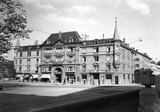A ban on political activity by foreigners is introduced in Brazil. The decree is essentially aimed at members of the Nazi Party, who represent a sizable proportion of Brazilians with German background. However the ban also affects the activities of émigrés. On the pretext of security, the so-called May Decree is introduced in France. It mandates heavy prison sentences for foreigners who enter the country illegally. During the Reich Music Conference the exhibition Degenerate Music is launched; a companion piece to the Degenerate Art exhibition, it defames musicians and composers who find themselves outside the confines of Nazi ideology. The "Law on the Confiscation of Products of Degenerate Art" is passed. From this point in time onwards, works of art designated “degenerate” can be seized without compensation. The law also retroactively legitimises the confiscations of the previous year and creates a basis for the now beginning “exploitation” of “degenerate art”, which means selling it in exchange for foreign currency or for older works of art.
The "June Action", in which men categorised as "anti-social" are arrested and thrown into concentration camps, comes to a close. On the orders of Adolf Hitler the scope of the action is broadened to include Jews. 
Schauspielhaus Zurich, circa 1935
© Baugeschichtliches Archiv der Stadt Zürich
In Zurich's Schauspielhaus theatre, with its clear anti-fascist orientation, the Neue Schauspielhaus AG is established at the instigation of publisher Emil Oprecht and dramaturge Kurt Hirschfeld. Until now the theatre is run privately by its owner Ferdinand Rieser, and from 1933 provides emigrants from Germany a place to work and perform. Exerted to pressure from the German authorities and Nazi sympathisers in Switzerland, the theatre is put up for sale.
The Évian Conference takes place on the initiative of US President Franklin D. Roosevelt. Representatives from 32 nations come together here to improve the opportunities for German and Austrian Jews to emigrate who have been subject to persecution by the Nazis in their home countries. The Conference ends without any major results, as the willingness to receive Jewish refugees is very limited.
Opening of the exhibition Twentieth Century German Art in the New Burlington Galleries in London The majority of the works exhibited come from German exiles living in London. The impact of the project, which is designed as a counter-exhibition to Degenerate Art is weakened by the British government’s appeasement policy.
Formation of the Intergovernmental Committee on Refugees (IGC) at the Évian Conference The Committee's objective is to negotiate further entry contingencies for Jewish refugees from Germany and Austria and coordinate their orderly exit from Germany with the authorities there.
The Dominican Republic declares that it will accept between 50,000 and 100,000 Jewish refugees. This makes the Dominican Republic the only country to declare itself willing – as part of an agricultural settlement plan – to receive a large number of expatriated Jews. However, by doing so, the Dominican dictator is merely attempting to improve his reputation as he was responsible, prior to this, for ordering the massacre of immigrants from neighbouring Haiti in his own country.

